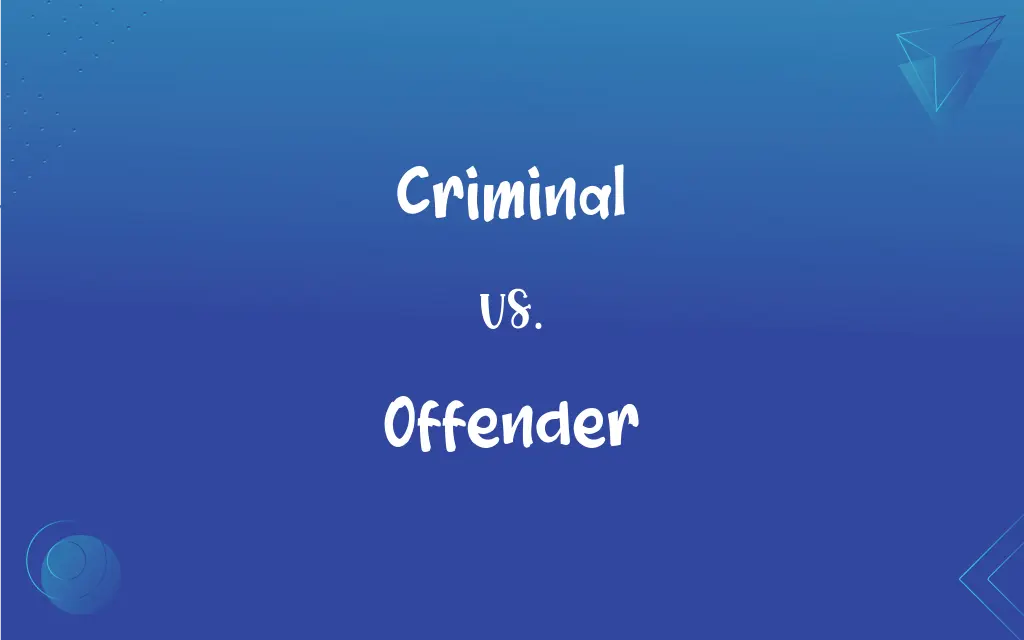Criminal vs. Offender: What's the Difference?
Edited by Janet White || By Harlon Moss || Updated on November 2, 2023
A criminal is someone who has committed a crime, while an offender is a person who violates any legal or moral code.

Key Differences
A criminal is specifically someone who has been convicted of a crime, typically one that is considered a serious breach of the law, such as theft or murder. This term implies a legal judgment; criminals have been processed through the criminal justice system. Offenders, on the other hand, can refer to anyone who commits an offense, which might not necessarily be a crime, like a traffic violation or a breach of social etiquette.
In the eyes of the law, a criminal carries a heavier connotation, often associated with an act that society seeks to deter and punish through imprisonment or other legal sanctions. An offender may refer to someone who has committed a less severe act, or it can be used in a broader sense encompassing all who break rules, whether they are societal, legal, or personal boundaries.
The term criminal often refers to a person who partakes in ongoing unlawful behavior, suggesting a certain lifestyle or choice. Offender can be used for those who may have committed a singular or infrequent act. Therefore, while all criminals are offenders, not all offenders are criminals.
When speaking about rehabilitation, a criminal is someone who requires reintegration into society following punishment for their crimes. Rehabilitation efforts for offenders might focus more on behavior correction and restorative justice, particularly if the offenses are minor.
Juvenile delinquents are often referred to as offenders rather than criminals, to emphasize the potential for change and rehabilitation. In contrast, habitual lawbreakers are typically labeled criminals, underscoring the severity and repetition of their actions.
ADVERTISEMENT
Comparison Chart
Definition
One who has committed a crime
One who has committed an offense
Legal Implications
Faces criminal charges
May face civil or criminal charges
Severity
Usually involves serious crimes
Can involve minor or major breaches
Connotation
Heavier, implies repeated offenses
Broader, can be a one-time breach
Relationship
Specific subset of offenders
Includes all types of violators
ADVERTISEMENT
Criminal and Offender Definitions
Criminal
Person who commits a crime.
The criminal was apprehended by the police.
Offender
A person breaking a rule or law.
The offender was caught speeding.
Criminal
Guilty of crime.
He was proven to be a criminal in court.
Offender
Someone who commits an illegal act.
The offender was fined for littering.
Criminal
Involving illegal activity.
She was involved in a criminal enterprise.
Offender
An individual who causes offense.
The offender apologized for the rude comment.
Criminal
Morally wrong.
His criminal negligence resulted in a disaster.
Offender
Party guilty of an offense.
The juvenile offender was given community service.
Criminal
Unlawful person.
A known criminal frequented the abandoned warehouse.
Offender
A violator of social norms.
He became an offender by disrupting the ceremony.
Criminal
Of, involving, or having the nature of crime
Criminal abuse.
Offender
To cause displeasure, anger, resentment, or wounded feelings in
We were offended by his tasteless jokes.
Criminal
Relating to the administration of penal law.
Offender
To be displeasing or disagreeable to
Onions offend my sense of smell.
FAQs
What is a criminal act?
A criminal act is behavior that violates a law and is punishable by the state.
Can someone be a criminal without being convicted?
Legally, a person is considered innocent until proven guilty, so they would not be labeled a criminal without a conviction.
Are all illegal acts considered criminal?
Generally, yes, but there are civil offenses that are illegal yet not classified as criminal.
Is 'criminal' a legal term?
Yes, it is used in legal contexts to describe someone who has been convicted of a crime.
Can a criminal record be cleared?
In some jurisdictions, criminal records can be expunged or sealed under certain conditions.
What defines a criminal?
A criminal is a person who has committed a crime.
Do criminals always go to jail?
Not necessarily; sentencing varies based on the crime, legal system, and jurisdiction.
What is a first-time offender?
An individual who has been officially recognized as having committed an offense for the first time.
What types of offenses do offenders commit?
Offenses can range from minor traffic violations to serious crimes.
What's the difference between a criminal and a felon?
A felon is a criminal who has committed a felony, which is a more serious crime.
Who is an offender?
An offender is a person who has committed an offense, which may be criminal or civil in nature.
Can someone be an offender by accident?
Yes, if they unintentionally break a law or commit a minor civil offense.
Does an offender always receive a punishment?
Most offenders face consequences, but the nature and severity vary widely.
How is an offender rehabilitated?
Rehabilitation can include education, therapy, community service, or other corrective programs.
Are crimes always intentional?
Most crimes require intent, but there are strict liability offenses where intent is not a factor.
Can a juvenile be an offender?
Yes, juveniles can be offenders, but they are often subject to different legal processes.
What is a career criminal?
A person who repeatedly engages in criminal activity and has multiple convictions.
Is 'offender' synonymous with 'criminal'?
Not always; while all criminals are offenders, not all offenders have committed a crime that warrants a criminal label.
Is the term 'offender' used in legal proceedings?
Yes, it's often used in both criminal and civil proceedings.
Are traffic violators considered offenders?
Yes, they are offenders as they have committed a traffic offense.
About Author
Written by
Harlon MossHarlon is a seasoned quality moderator and accomplished content writer for Difference Wiki. An alumnus of the prestigious University of California, he earned his degree in Computer Science. Leveraging his academic background, Harlon brings a meticulous and informed perspective to his work, ensuring content accuracy and excellence.
Edited by
Janet WhiteJanet White has been an esteemed writer and blogger for Difference Wiki. Holding a Master's degree in Science and Medical Journalism from the prestigious Boston University, she has consistently demonstrated her expertise and passion for her field. When she's not immersed in her work, Janet relishes her time exercising, delving into a good book, and cherishing moments with friends and family.































































